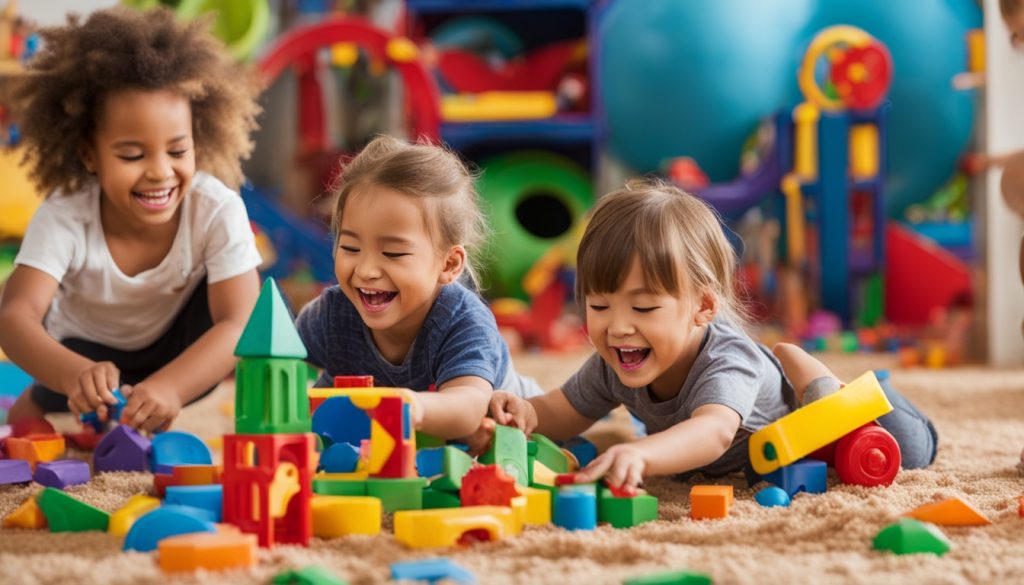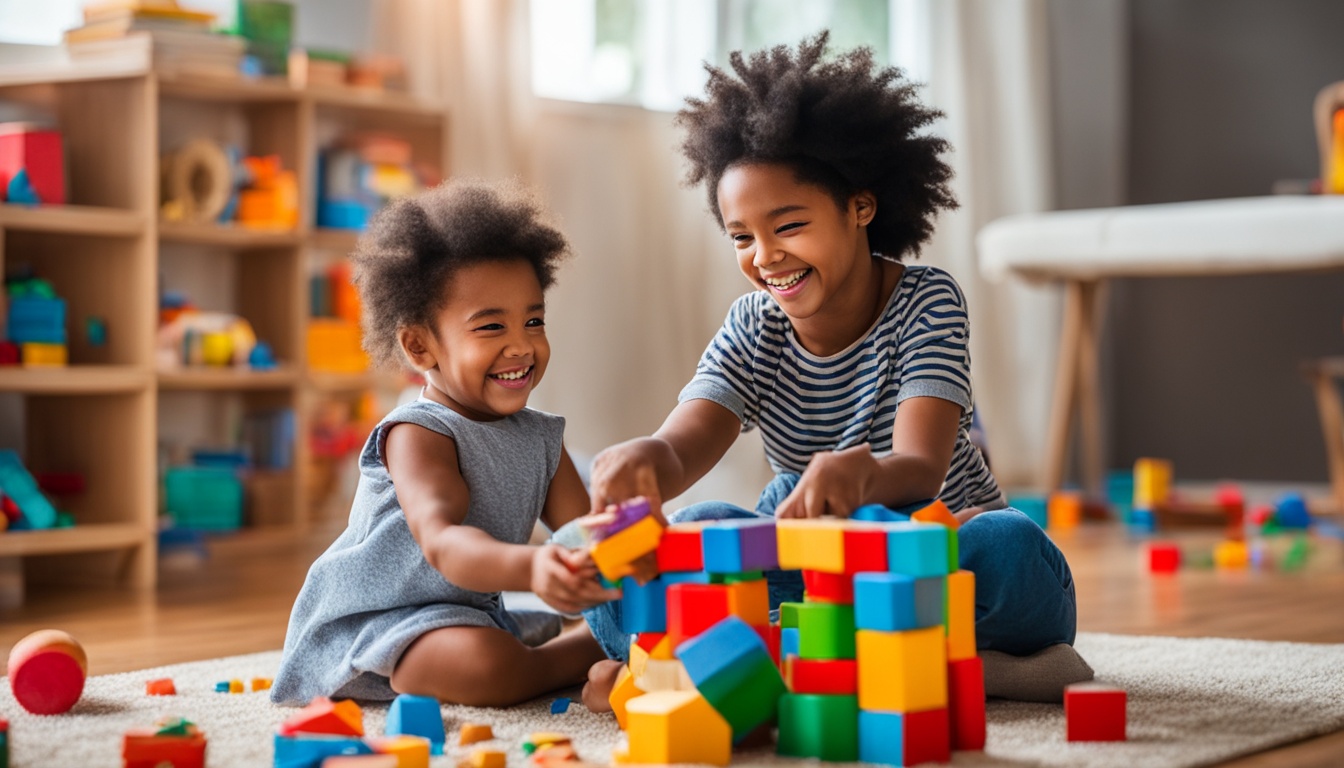It’s a quiet evening, and you’re tucking your child into bed. As you pull the blanket up, you see a little smile on their face. This shows they feel safe and happy. Ensuring your child’s social and emotional needs is key to their growth.
Positive parenting is crucial for this growth. In today’s fast world, managing screen time and hitting milestones can be tough. But focusing on your child’s well-being is vital.
Studies show that mentally healthy kids are happier and more motivated to learn. They do better in school and enjoy class more. On the other hand, kids with social and emotional issues might not follow directions well or connect with friends. This can lead to low self-esteem, poor grades, and even getting suspended.
As a parent, you greatly affect your child’s social and emotional health. Your actions can shape their development, learning, and happiness. Showing love and warmth, even when it’s hard, is important. Spending quality time with your child boosts their social, emotional, and academic growth.
Valuing these moments changes how you parent. By using positive reinforcement and modeling good social and emotional skills, you create a supportive environment. Let’s see how we can help our children grow socially and emotionally.
Key Takeaways
- Positive parenting greatly influences your child’s social and emotional health.
- Building self-esteem in children requires consistent warmth and affection.
- Mentally healthy children show higher academic performance and participate more in class activities.
- Supporting child mental health involves proactive strategies such as quality time and positive reinforcement.
- Managing screen time and maintaining routines are essential for balanced development.
Understanding Social and Emotional Development
Supporting your child’s social and emotional growth is key to their happiness. Knowing how they develop emotionally and socially helps create a caring environment for them.

What is Social-Emotional Development?
Social-emotional development is how kids learn about feelings, make friends, and handle social situations. It includes skills like making friends, working together, managing feelings, understanding others, and solving problems. From the start, kids start learning these skills by interacting with those who care for them.
For kids under three, recognizing and naming feelings is the first step in handling them later. Between three and eight, they keep learning about feelings through play and reading books about them. This helps grow Emotional Intelligence in Children.
Key Social-Emotional Skills in Early Childhood
In early childhood, important social-emotional skills are joining in group activities, sharing feelings, and showing interest in others. These skills are vital for Child Social Skills Development. For instance, playing games that teach sharing and taking turns boosts social skills.
Encouraging kids to try new things and play imaginatively helps them be more creative. At this time, parents are very important. Showing good feelings and actions can really shape a child’s growth.
| Age Group | Key Skills | Supporting Activities |
|---|---|---|
| 0-3 Years | Recognizing and naming emotions | Interactive play, naming emotions during routines |
| 4-8 Years | Managing emotions, teamwork | Reading books about emotions, group games |
| 9-12 Years | Empathy, relationship building | Engaging in conversations about emotions, cooperative play |
Importance of Social-Emotional Health
Social-emotional health is very important. Kids who know and handle their feelings do better in school, make friends easily, and become more independent. Learning to understand and manage feelings early helps them recover from tough times and control their impulses.
Teaching Emotional Intelligence in Children early is linked to success throughout life. Fixing social-emotional issues early can greatly improve a child’s health and well-being. This sets a strong base for future achievements.
“Children with well-developed social-emotional skills are generally more motivated, happier, and academically successful.”
Role of Play in Developing Social Skills
The American Academy of Pediatrics highlights play’s key role in child development. It helps build strong brains, bodies, and social connections. Play boosts a child’s planning, organization, social interaction, and emotional control.
Types of Play that Enhance Social Skills
Various play types deeply affect a child’s social skills. Unstructured play lets young kids use their imagination and set their pace. Structured play, led by adults, helps older kids learn specific skills and follow rules. Outdoor play lets kids explore, be active, and test their limits.
- Unstructured Play: Key for young kids, it boosts creativity and independence.
- Structured Play: Teaches older kids specific skills and rules.
- Outdoor Play: Encourages physical activity, exploration, and nature interaction.

Encouraging Cooperative and Imaginative Play
Parents can help kids develop social skills through creative play with others. This type of play enhances cooperation, teamwork, and creative problem-solving.
- Sharing resources.
- Engaging in role-playing games.
- Organizing team activities.
Using Play to Teach Empathy and Conflict Resolution
Play is great for teaching empathy and conflict resolution. Through play, kids learn about others’ feelings, appreciate differences, and practice sharing and solving problems. This approach helps manage tantrums and encourages independence.
| Age Group | Recommended Play Activities |
|---|---|
| Newborns | Activities that develop hearing, movement, touch, and grasping skills. |
| Toddlers | Running, jumping, climbing, balancing, and imaginative dress-up games. |
| Preschoolers | Unstructured play with everyday items, simple jigsaw puzzles, playdough, and creative music-making. |
| School-age Children | Building cubbyhouses, obstacle courses, word play games like ‘I spy,’ simple cooking activities, and imaginative play. |
Diverse play forms are crucial for child development. They provide natural, fun ways to improve social skills, manage tantrums, and encourage independence.
Building a Supportive Environment at Home
Creating a supportive home is key to your child’s growth. Focus on important areas to make a nurturing space. This space should make your child feel safe, loved, and understood.
Creating a Safe Space for Emotions
It’s vital to have a special area for kids to relax and feel their emotions. This could be a cozy corner or a room just for them. It lets them express themselves freely. This helps them learn how to handle their feelings in the family.
It’s also crucial to support them by listening and comforting them. This Positive Reinforcement Parenting makes kids feel secure and valued.

Modeling Positive Social and Emotional Behavior
Children watch their parents closely. Showing them good behaviors like sharing and empathy helps them do the same. Saying “I love you” and showing love makes them feel secure. This is part of Creating Family Traditions and Rituals, giving them a sense of belonging.
Listening to your child without judging helps create a supportive space. It encourages open talks and respect. This teaches them how to be positive with others.
Establishing Routines and Predictability
Having routines gives kids a sense of security. Regular family dinners are great for bonding and setting clear rules. Studies show kids who have dinner with their families behave better and do well in school.
Getting kids involved in household tasks teaches them responsibility. This fits well with Positive Reinforcement Parenting, as it rewards their efforts. It boosts their self-esteem and motivation.
| Aspect | Benefits |
|---|---|
| Quality Time | Building positive relationships, understanding children’s experiences |
| Safe Emotional Space | Allowing free expression, fostering emotional confidence |
| Positive Behavior Modeling | Encouraging adoption of positive habits, emotional security |
| Routines and Predictability | Providing stability, improving behavior and school performance |
By focusing on a safe space for feelings, modeling good behavior, and setting routines, you’re building a strong base for your child. These practices can make your family more supportive and harmonious.
Effective Communication Strategies with Your Child
Talking well with your child builds trust and understanding. By using Active Listening and giving thoughtful answers, your child feels heard and important. This is key in Parent-Child Communication. Here are ways to talk better with your child:

Active Listening and Reflective Responses
Active Listening means paying full attention to your child, looking them in the eye, and understanding their feelings. This makes them feel safe and brings you closer. By showing you care about what they say, they’ll talk more. Reflective answers also show you get their feelings, which helps with sibling issues.
- Make and maintain eye contact
- Eliminate distractions during conversations
- Use reflective phrases like “I understand that you feel…”
Encouraging Expressive Language and Feelings
Helping kids talk about their thoughts and feelings helps them share their needs clearly. It also helps them understand others. By talking about your feelings and using simple language, they’ll learn to do the same.
- Ask open-ended questions to keep conversations going
- Use age-appropriate language
- Set aside specific times for talking and listening
Validating and Naming Emotions
When you validate and name your child’s feelings, you help them understand and manage their emotions. This means you accept their feelings and teach them how to describe them. It’s a key part of talking well with your child that helps with feelings and behavior.
- Name emotions (“You seem upset,” “I can see that made you happy”)
- Show empathy and understanding
- Offer support and solutions when necessary
Using these talking strategies can make your relationship with your child better. It also helps their feelings and social growth. For more tips, check out this blog on supporting your child’s mental health. These skills create a strong base for talking well with your child.
“Children who feel loved and accepted are more likely to share their thoughts and concerns.”
Here’s a quick look at how these talking strategies help kids grow:
| Communication Strategy | Impact on Child Development |
|---|---|
| Active Listening | Helps children feel valued and understood, essential for trust-building |
| Encouraging Expressive Language | Fosters clear communication of needs and emotions, promoting emotional intelligence |
| Validating Emotions | Supports emotional regulation and coping skills, enhancing overall wellbeing |
Gardening Communication and Trust
Building a strong bond with your child is key to a loving family. Gardening is a great way to do this. It lets you spend quality time together, improving communication and trust.
Spending Quality Time Together
Gardening is perfect for bonding with your child. Wildflowers need a lot of early care and patience, says the Michigan Department of Natural Resources. Gardening with your child helps build a strong relationship. It teaches them the value of hard work and pride in their accomplishments.
They’ll grow their own food and develop a love for nature and healthy eating. This activity boosts their confidence and teaches them about the importance of a healthy lifestyle.
Maintaining Open and Honest Communication
Good communication is crucial for trust in any relationship. Gardening offers many chances for talking and learning. As kids learn about plants and nature, parents can guide them, deepening their bond.
Setting up a regular gardening routine helps teach kids about hard work. It makes them see the effort as rewarding and important.
Encouraging a Growth Mindset
Gardening is a great way to teach kids about a growth mindset. Julie Lythcott-Haims, a former dean at Stanford University, says focusing too much on perfection isn’t good for kids. Instead, learning from mistakes in the garden teaches them that setbacks are part of growing.
Some wildflowers don’t bloom until their second year. This teaches kids about patience and persistence. These are key to a growth mindset. Gardening shows the value of trying hard and not giving up.
Promoting Emotional Intelligence in Your Child
Teaching your child about emotional intelligence is key to their growth and happiness. It’s important to teach them about responsibility and resilience. These skills help with their emotional and social growth.
Teaching Self-Regulation and Coping Strategies
By age four, kids start using simple ways to control their feelings, like covering their eyes when scared. Encouraging these actions helps build resilience. As they get older, around ten, they use more complex ways to handle their feelings.
Teaching self-control is crucial. It affects their health, income, and even their choices about alcohol. Studies show self-control is more important than IQ or family background for success.
Building Empathy and Understanding
Feeling understood is key to emotional intelligence. When kids feel their feelings are accepted, they can solve problems better. Emotion coaching is a great way for parents to help.
This method means understanding and validating your child’s feelings. It helps them learn empathy. This way, they can make strong, caring relationships.
Praising Effort, Not Just Outcomes
It’s important to praise your child’s hard work, not just their results. This teaches them the value of effort and keeps them motivated. It shows them success comes from trying hard and learning from mistakes.
This mindset helps kids see that winning isn’t everything. It’s about pushing through and always learning.
Here’s a comparative table illustrating key insights on emotional intelligence and its impact:
| Aspect | Emotional Intelligence (EQ) | IQ |
|---|---|---|
| Predictor of Success | Twice as strong as IQ | Weak predictor |
| Parenting Style Influence | Emotion coaching; Empathy and Understanding | Limited influence |
| Long-term Benefits | Healthier relationships, better job performance | Mostly academic success |
Parenting and Raising Kids with a Focus on Emotional Health
Parenting today is a challenge, especially with technology at home. Using Effective Discipline Strategies, Nurturing Child Creativity, and understanding Parenting in the Digital Age is key to raising emotionally healthy kids. This part talks about ways to help your child feel emotionally well.
The Role of Positive Reinforcement
Positive reinforcement is key for good behavior and emotional health. By praising your child for good actions, you make them want to do it again. This boosts their confidence and helps them be creative. Research shows that positive reinforcement gives kids a strong sense of security and emotional balance.
Setting Boundaries with Care and Love
Setting boundaries with love is important for kids to know what’s expected. This helps them feel safe and learn right from wrong. Setting boundaries with empathy and respect helps kids manage their feelings better. Here’s a look at how parenting affects mental health:
| Types of Mental Health Conditions | Impact on Parenting |
|---|---|
| Anxiety Disorders | Difficulty in maintaining routines and guiding consistent behavior. |
| Depression | Challenges in emotional connection with children. |
| Bipolar Disorder | Struggle balancing work and family life effectively. |
| Obsessive-Compulsive Disorder | Additional responsibilities on children like cooking and cleaning. |
| Schizophrenia | Children experience confusion and potential self-blame. |
| Post-Traumatic Stress Disorder | Harder to emotionally connect and guide child’s behavior. |
Balancing Discipline and Emotional Support
Finding the right balance between discipline and emotional support is crucial. Create a structured home with clear rules but also offer emotional support. Using Effective Discipline Strategies with love helps your child feel safe and valued. This balance prevents emotional and behavioral problems from neglect or too much indulgence.
Knowing these things and using the right methods can greatly help your child’s emotional growth. Encourage good behavior with rewards, set kind boundaries, and keep discipline and support in balance. These are key to helping your child thrive in today’s digital world.
Integrating Social and Emotional Learning in Daily Activities
Adding social and emotional learning (SEL) to daily life helps your child grow. Activities that teach emotions and social skills make a big difference. They boost your child’s development.
Using Children’s Books to Teach Emotions
Children’s books are great for teaching SEL. They let kids see different feelings through stories. This helps them understand and share their own feelings better.
It also helps teach kids good manners and how to talk about tough topics.
“Books can open doors to discussions about feelings, helping children to understand and express their emotions better.”
Incorporating Social Skills into Everyday Routines
Being consistent is important. Adding social skills to daily routines lets kids practice and use what they learn. Sharing toys or helping at home teaches them valuable lessons.
Outdoor play also helps kids work together and talk better with others. This is key for getting ready for kindergarten.
Encouraging Creative and Reflective Activities
Activities like art, music, and journaling help kids express feelings and grow. They give kids ways to show who they are and think deeply. This helps them deal with feelings and experiences.
When parents get involved, it makes these activities better. It also makes the parent-child bond stronger. This is good for a child’s well-being and success.
| Activity | Benefits |
|---|---|
| Reading Children’s Books | Helps in understanding and expressing emotions |
| Structured Play | Enhances cooperation and communication |
| Creative Endeavors | Support emotional expression and cognitive growth |
By doing these things every day, social and emotional learning stays a big part of your child’s life. This helps them do well in school, with friends, and in life.
Seeking Additional Support and Resources
Understanding the complexities of supporting a child’s social and emotional growth often requires outside help. It’s key to build a support network beyond just family for full development.
Utilizing School Counselors and Psychologists
Using school counselors and psychologists is a smart move. They can spot and tackle specific needs, offering both quick and long-term help. Their individual support is crucial, especially in school where kids spend a lot of time.
Accessing Community Resources
Looking beyond school, community resources add to the support needed for social and emotional growth. Communities have many programs, like parenting classes and counseling. For example, APA’s website has trusted parenting tips that can help parents find reliable info.
Joining Parenting Support Groups
Joining parenting support groups is also a great idea. These groups let parents share stories, advice, and support. By connecting with others, parents get practical tips and feel part of a community. These groups are great for talking about parenting issues and finding solutions together, which lowers stress and builds a supportive circle.
| Support Resource | Benefits |
|---|---|
| School Counselors and Psychologists | Personalized support, effective long-term strategies, assistance within school settings |
| Community Resources | Access to parenting programs, workshops, and evidence-based information |
| Parenting Support Groups | Shared experiences, practical advice, emotional support, community building |
By using these resources, you can make a richer, supportive environment for your child’s social and emotional growth.
Conclusion
Supporting your child’s social and emotional growth is a journey that needs care and attention. It’s important to understand how they feel and communicate well. By doing this, you help them face life with strength and confidence.
Playing together, teaching emotional smarts, and balancing work and family life are key. These actions help build a strong base for your child’s health. Studies show that kids do well in homes where respect and empathy are key. This approach helps them grow in both mind and heart.
It’s also key to get extra help when you need it, like using school resources or joining groups for parents. Being a supportive parent and teaching kids about money shows you care about their future. With these steps, you’re helping your child do well in life, socially, emotionally, and in school.
FAQ
What is Social-Emotional Development?
What are key social-emotional skills in early childhood?
Why is social-emotional health important?
What types of play enhance social skills?
How can parents encourage cooperative and imaginative play?
How does play teach empathy and conflict resolution?
How can you create a safe space for emotions at home?
How can you model positive social and emotional behavior?
Why are routines and predictability important for children?
What are effective communication strategies with children?
How can you encourage a growth mindset in your child?
What are some ways to promote emotional intelligence in children?
How does positive reinforcement impact emotional health?
What role do children’s books have in teaching emotions?
Where can parents seek additional support for social and emotional development?
This post contains affiliate links. If you click on a link and make a purchase, I may earn a small commission — at no extra cost to you. Thank you for supporting this blog and helping me keep the patterns free! Read the full Affiliate Disclosure & Transparency.
